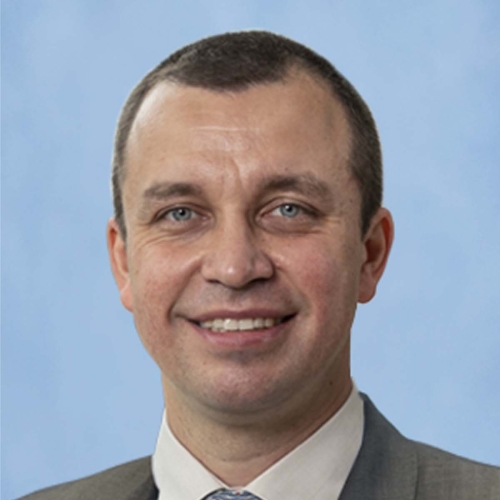
2800 Plymouth Rd
Ann Arbor, Michigan 48109
Available to mentor

Andriy Myronovych, is an Assistant Research Scientist in the Department of Surgery, University of Michigan School of Medicine. Dr. Myronovych received his MD degree from the Lviv Medical University, Lviv, Ukraine in 2003. After completing his residency in general surgery and receiving a scholarship from the Japan Ministry of Education, Culture, Sports, Science and Technology, he continued his education as a PhD student at the University of Tsukuba, Japan. He successfully defended his thesis on hepatic regeneration and obtained his PhD degree in 2010. In that year he moved to Indiana University-Purdue University Indianapolis, Indianapolis, Indiana as a research fellow, where he continued his research on liver regeneration. The following year, in order to deepen his knowledge in the field of hepatology, Dr. Myronovych underwent further postdoctoral training at Cincinnati Children’s Hospital Medical Center, Cincinnati, Ohio where he conducted research in the area of non-alcoholic fatty liver disease (NAFLD) and obesity. He joined the Department of Surgery at the University of Michigan, Ann Arbor, Michigan in 2014 as a Research Specialist and is currently an Assistant Research Scientist, following his promotion to this position.
Department of Surgery
-
Post-doctoral research fellowCincinnati Children's Hospital Medical Center, Cincinnati, 2014
-
Post-doctoral fellowIndiana University – Purdue University Indianapolis, Indianapolis, 2011
-
ResidentDanylo Halytsky Lviv National Medical University, Lviv, 2005
-
PhDUniversity of Tsukuba, Tsukuba, 2010
-
MScDanylo Halytsky Lviv National Medical University, Lviv, 2005
-
MDDanylo Halytsky Lviv National Medical University, Lviv, 2003
-
Center MemberCaswell Diabetes Institute
Dr. Myronovych’s research interests lie in the areas of etiology and treatment of NAFLD and promotion of hepatic regeneration. The important goals of his research are to develop therapies for NAFLD as a comorbidity of obesity, and to activate adequate regeneration of the fatty liver. This research has the potential to benefit metabolically compromised patients who have undergone massive liver resection due to a tumor or have experienced living donor liver transplantation, in order to properly stimulate compensatory liver growth and maintain adequate homeostasis. Building on his previous research conducted in this field, Dr. Myronovych is aiming to understand the role of bile acids (which act as signaling molecules), the nuclear receptor FXR and fibroblast growth factor 15/19 (FGF15/19) in the amelioration of hepatic steatosis and promoting liver regeneration. His approach extensively utilizes preclinical experimental animal surgery models and molecular methodologies to investigate the underpinnings of these molecular mechanisms.
-
Myronovych A, Blok N, Lewis AG, Bozadjieva-Kramer N, Seeley R. Gastroenterology, 2024 May; 166 (5): s - 477.Journal ArticleSa1565 THE IMPACT OF INTESTINAL FIBROBLAST GROWTH FACTOR 15 DELETION ON REGENERATION OF FATTY LIVER AFTER 70% PARTIAL HEPATECTOMY IN DIET-INDUCED OBESE MICE
DOI:10.1016/s0016-5085(24)01568-3 -
Bozadjieva-Kramer N, Shin JH, Li Z, Rupp AC, Miller N, Kernodle S, Lanthier N, Henry P, Seshadri N, Myronovych A, MacDougald OA, O'Rourke RW, Kohli R, Burant CF, Rothberg AE, Seeley RJ. JCI Insight, 2024 Apr 8; 9 (7):Journal ArticleIntestinal FGF15 regulates bile acid and cholesterol metabolism but not glucose and energy balance.
DOI:10.1172/jci.insight.174164 PMID: 38587078 -
Li Z, Qiu K, Zhao J, Granger K, Yu H, Lewis AG, Myronovych A, Toure MH, Hatsell SJ, Economides AN, Seeley RJ, MacDougald OA. Bone, 2023 Apr; 169: 116682Journal ArticleAntibodies to sclerostin or G-CSF receptor partially eliminate bone or marrow adipocyte loss, respectively, following vertical sleeve gastrectomy.
DOI:10.1016/j.bone.2023.116682 PMID: 36709915 -
Bramlage KS, Bhattacharjee J, Kirby M, Myronovych A, Gupta R, Gonzalez R-MS, Xanthakos S, Bove K, Kohli R. J Pediatr Gastroenterol Nutr, 2021 Jul 1; 73 (1): 99 - 102.Journal ArticleA Diet High in Fat and Fructose Induces Early Hepatic Mitochondrial Aging.
DOI:10.1097/MPG.0000000000003068 PMID: 34135298 -
Myronovych A, Peck BCE, An M, Zhu J, Warm A, Kupe A, Lubman DM, Seeley RJ. Am J Physiol Gastrointest Liver Physiol, 2021 Jan 1; 320 (2): G153 - G165.Journal ArticleIntestinal extracellular vesicles are altered by vertical sleeve gastrectomy.
DOI:10.1152/ajpgi.00224.2020 PMID: 33175569 -
Myronovych A, Bhattacharjee J, Salazar-Gonzalez R-M, Tan B, Mowery S, Ferguson D, Ryan KK, Zhang W, Zhao X, Oehrle M, Setchell KD, Seeley RJ, Sandoval DA, Kohli R. Am J Physiol Gastrointest Liver Physiol, 2020 Sep 23; 319 (6): G669 - G684.Journal ArticleAssessment of the role of FGF15 in mediating the metabolic outcomes of murine Vertical Sleeve Gastrectomy (VSG).
DOI:10.1152/ajpgi.00175.2020 PMID: 32967428 -
Myronovych A, Lewis A, Seeley RJ. Obes Surg, 2020 Apr; 30 (4): 1582 - 1585.Journal ArticleSome Caveats when Interpreting Surgical Mouse Models of Vertical Sleeve Gastrectomy.
DOI:10.1007/s11695-020-04459-7 PMID: 32052288 -
Arble DM, Evers SS, Bozadjieva N, Frikke-Schmidt H, Myronovych A, Lewis A, Toure MH, Seeley RJ. Surg Obes Relat Dis, 2018 Dec; 14 (12): 1857 - 1867.Journal ArticleMetabolic comparison of one-anastomosis gastric bypass, single-anastomosis duodenal-switch, Roux-en-Y gastric bypass, and vertical sleeve gastrectomy in rat.
DOI:10.1016/j.soard.2018.08.019 PMID: 30292648